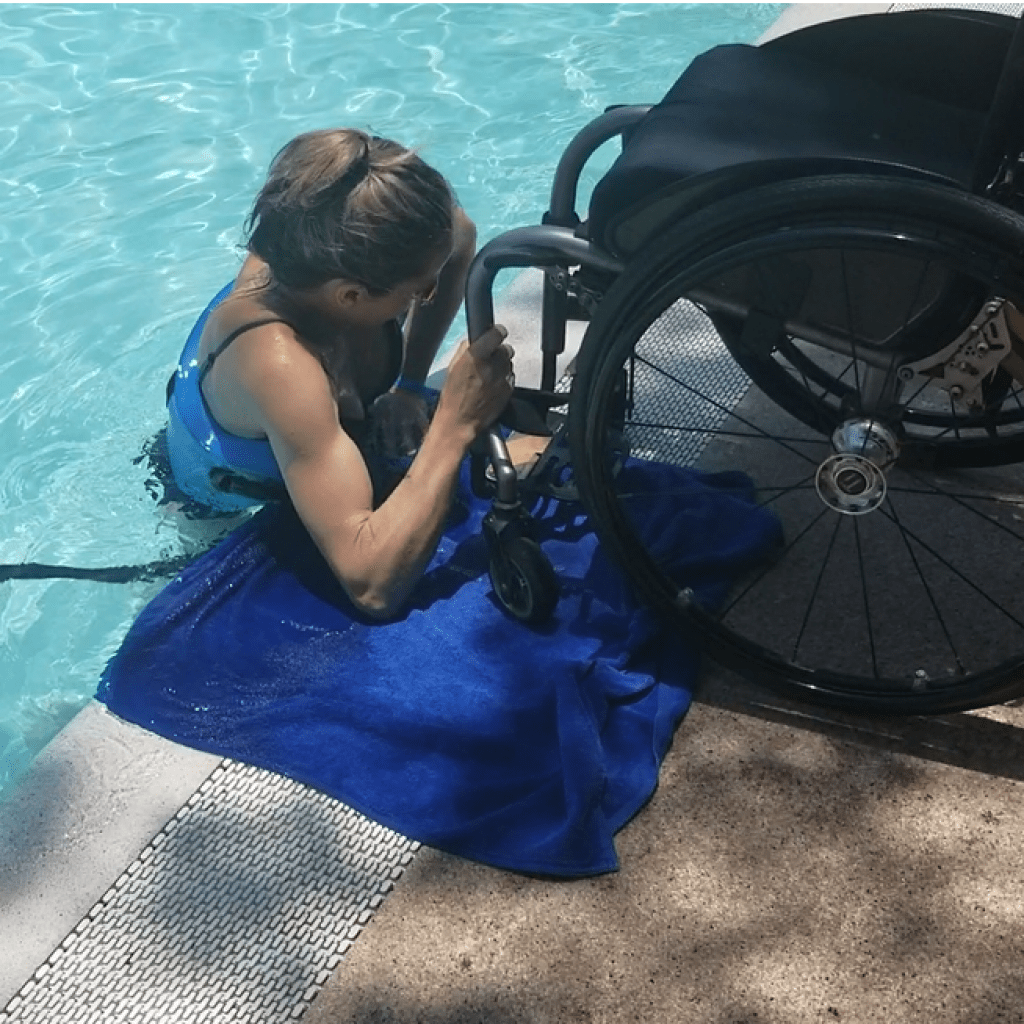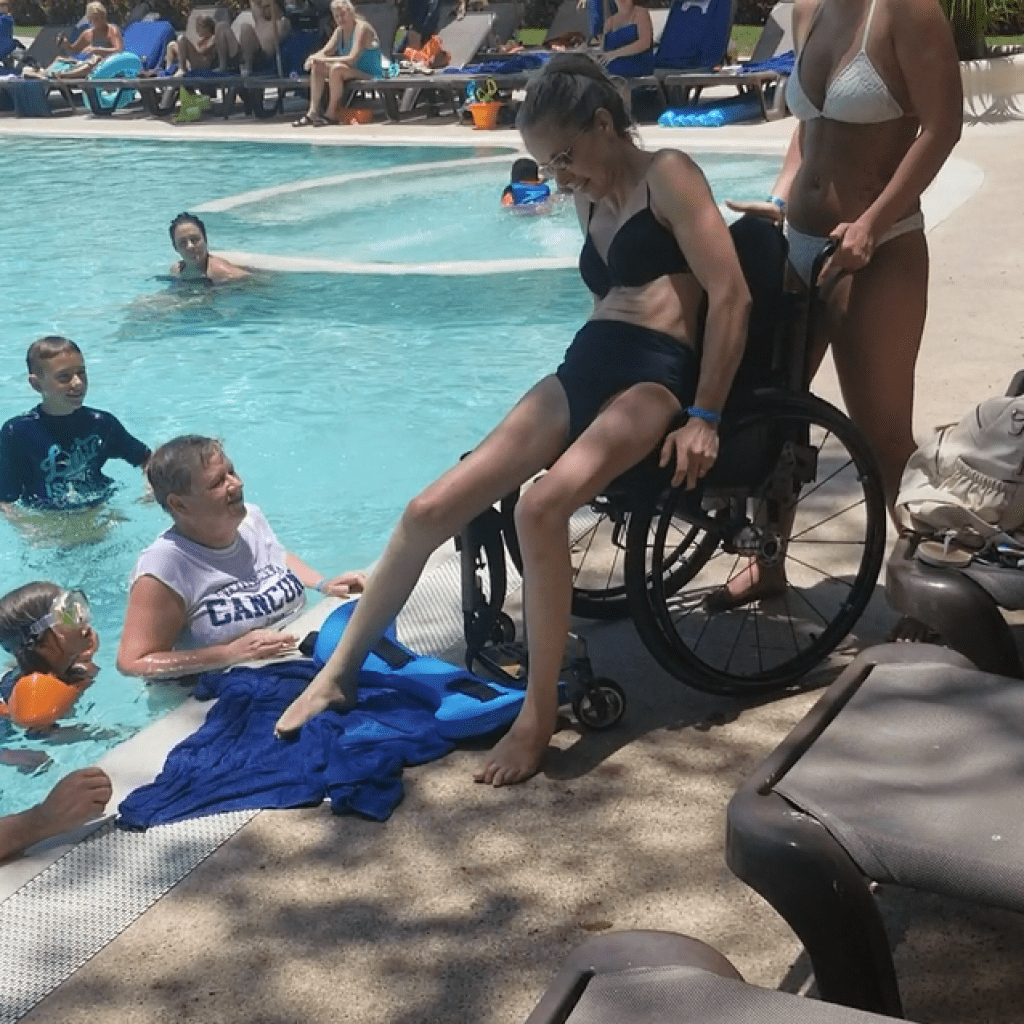What is your biggest fear when travelling abroad with a disability?
Is it losing your luggage? How about getting your wheelchair damaged? Maybe its running out of catheters or other medical supplies?
Well for me it was having to go to the hospital for some reason. Especially when I travelled to places like Mexico or Punta Cana that were outside of Canada or the US.
I worried about the language barrier, was skeptical about the quality of the medical care, and nervous about having to use my travel medical insurance. It all just scared the crap out of me.
I had heard from others that the medical care in Mexico was top notch but none of the people that I talked to had any kind of disability.
After 20 years in a wheelchair I knew that no matter where I was, having a disability often complicated hospital visits. On more than one occasion I had to explain basic information about my spinal cord injury to doctors that were clueless.
And that was in Canada. How much would doctors know in Mexico?
Well I found out last year when I was on holidays with my family.
The Backstory
It was day four and we were hanging by the pool when I decided that I wanted to practice getting in and out of the water completely by myself.
For the first time ever.
I had been working out since January and had it in my mind that I was getting pretty tough. I had recently learned to transfer from the floor to my wheelchair so I got confident and decided that I could get in the pool on my own, whether it was wheelchair accessible or not.
It was not.
I grabbed one of the floaties that my kids were swimming with and put in on the ground near the edge of the pool. I scooched my butt off my seat and lowered myself onto the floaty. I put my legs over the edge and into the water and pushed myself off.
Splash.
Success!
That was easy, I thought. No problem.
But then I had to get back out of the pool and into my chair. That proved to be more of a challenge.
I made it onto the pool deck with a bit of a struggle and backed up to my wheelchair, ready to lift myself. I gave a one, two, three, and lifted with all my might.
Except its really hard to lift when your hands are wet. I made it halfway up before slipping and falling, hitting my butt on my foot plate.
Ouch. I have zero fat left on my butt so it was basically bone hitting metal.
I didn’t give up though. I fell about 3 more times and then I got hulk mad and finally lifted myself into my wheelchair.
Awesome. That was fun.
My husband gave me the “I told you you shouldn’t have done that” look and then said I was silly but that he was proud of me.
I secretly agreed with him about the silly part but kept it to myself, hoping that when I went to check my butt later I wouldn’t have too big of a bruise.
When I Figured out I Definitely Hurt Myself
Later that evening, my leg started acting weird and I knew something was up.
I have spasticity and am used to the reflexes in my legs causing spams when I transfer or lay down. But that evening, my right leg, on the same side that I had hurt by butt, was freaking out. Everytime I moved; to go to the bathroom, transfer onto a bed, or anything where my leg wasn’t perfectly still it would jump and flex. My leg was also sweating like crazy and had goosebumps everywhere. Normally when it does this it means that there is pain somewhere that I can’t feel. Sometimes its just that I am sitting on something or my toe is curled in my shoe, but I checked everything I could think of and there seemed to be nothing wrong.
That’s when I remembered that I had hurt my butt earlier!
I got on the bed and used my mirror to see if I could find any bruises or marks.
Sure enough there was a red area.
That’s when I started to worry.
When you’re paralyzed you lose bone density, especially in your hips, so I immediately started wondering if it was possible that I broke a bone when I fell while transferring into my wheelchair from the pool.
Could I have broken my hip?
All of a sudden my biggest fear about travelling was becoming a reality.
Now What Do I Do?
I wasn’t sure whether I had really hurt myself but I didn’t want to wait around and do nothing in case I had.
I called my travel insurance provider and asked what I should do. The operator told me to go see the doctor onsight at the resort.
I made my way over to the doctor’s office with my mom, trying no to freak out.
When I got there, the person on staff (who was actually more like a nurse or paramedic rather than a doctor) determined that because I can’t feel and she couldn’t diagnose anything without an x ray, that I should go to the hospital to get checked out.
Ok, great. Here we go. All my fears are officially coming true.
Hospital Bound
She told me to go and get my passport and insurance information so that I could be medically transported to the hospital.
My mom was with me as we waited for the medical transport…..which I assumed would be an ambulance.
What showed up was not an ambulance. It looked more like a service van; the kind that electricians or plumbers use here in Canada. It was not wheelchair accessible and it looked like it had seen better days. But it did say “Medical Transport” on the side so…
The drivers saw that I was in a wheelchair and offered to lift me into the van which I thought was good because I would have needed help if I had been by myself. It was nice to know that they would have been able to do that.
My mom was there so she just lifted me in. A few minutes later we were on the way to the hospital.
The van didn’t look like an ambulance, but the drivers definitely drove like it was an ambulance. It was kinda scary, but we made it to the hospital in one piece.
Hospiten
When we arrived at the hospital, named Hospiten, we were directed to a front desk. It was more like a hotel lobby than an emergency room triage. The staff all spoke English pretty well so we were able to explain that I was concerned about a broken bone without too much trouble. The most confusing part was filling out the paperwork because it was all in Spanish and I wasn’t sure what I was reading or signing. I am a naturally trusting person so I believed the hospital staff about what it said.
In hindsight I should have taken the time to translate the forms with my phone to be sure about what I was signing. I didn’t run into any issues with having signed the papers but I have since read many reviews and stories where people have signed things that obligated them to pay certain amounts of money or releasing rights to visit alternate hospitals.
Seeing the Doctor
After I signed the necessary paperwork we were shown to a waiting room. Within about 20 minutes I was taken to get an xray and then shown to a private room to wait for the doctor. We waited another 20 minutes for the doctor to come, who said that I would be seeing an orthopedic surgeon who could read the x ray better. The orthopedic surgeon came shortly after and spoke English really well. He was super nice and very knowledgeable. He even knew about spinal cord injury related complications so I didn’t have to spend time trying to explain anything to him. He informed me that my x ray was normal and that what I had done was over extend a nerve in my hip that was likely now inflamed and sensitive to any movement. He prescribed an anti-inflammatory and another drug that was supposed to help with the nerve discomfort and said that I was free to go.
We were sent back to the waiting room where we had to finish some paperwork and then pay. The total bill for the consultation, x ray, and visit from the orthopedic surgeon was $500 USD, which I thought was really reasonable.
One hiccup we ran into is the fact that I was using my husband’s insurance card which didn’t have my name on it. I had to get my husband to send a picture of his driver’s license to prove that I was authorized to use the card. This was a huge hassle because my entire family, except my mom and I, had gone to a Pirates of the Caribbean dinner show so they didn’t even know we had gone to the hospital. It took a long time for us to get in touch with them and by the time we finally got the picture of his driver’s license I had already gotten the x ray, had seen the doctor, and was cleared to go. I ended up having to pay out of pocket because the hospital didn’t get a response from the insurance company before were ready to leave.
Off to Get Prescriptions
In order to get the prescriptions filled and get back to the hotel we had to take a taxi. I was super nervous about this because neither my mom or I speak any Spanish and I had heard stories of taxi drivers getting people in their vehicle and then threatening them if they didn’t pay whatever they demanded. It didn’t help that it was getting pretty late at night and it was dark and quiet in Cancun. I figured there wasn’t really any other way to get back to the hotel so I just tried to stay calm and go with the flow.
The taxi showed up and my mom and I got in. I crossed my fingers and hoped for the best. When I saw pictures of the taxi driver’s kids and family posted all over the cab, I took it as a sign that he probably wasn’t a murderer.
The Drive Around Cancun
We had to drive around Cancun for about an hour to find a pharmacy that was open since it was getting late. After a little confusion with a debit machine and some lucky help from a shirtless, shoe-less man that had wondered up to the pharmacy at the same time as us, we were on our way back to the hotel. We finally got back at around 10:30 pm. The cab fair was $80 USD which, again, I thought was pretty reasonable. We even beat the rest of my family back to the hotel from their dinner theater.
The hospital was not fancy, but it was clean. The staff weren’t overly friendly but I feel I was treated pretty well. In total, from the time I went and saw the resort doctor to when I got back to the hotel it was around 4 hours. Overall, I was pretty impressed with the hospital, the doctors and the whole process.
I am grateful that I was able to get a taste of the healthcare system in Mexico for a relatively minor incident and that I now know how to be more prepared for my next trip.
How to Prepare for a Medical Emergency When Travelling
Here is what I learned and what I would recommend if you are travelling to Mexico or any other country where you are unsure of the medical care:
- Review your travel medical insurance so that you know what is covered. When you know what your insurance covers you will know what to expect if you have to pay out of pocket for something. You will also protect yourself from being scammed into thinking that your insurance was denied and paying someone you shouldn’t. Many insurance companies don’t cover transportation to and from the hospital and some insurance companies consider certain types of disabilities to be pre-existing conditions. Knowing who and what your insurance covers is important.
- Research which hospitals are in the area that you are staying. Know which ones are private and which ones are public and read reviews. I had no idea whether the hospital I was being sent to was a good one or not. I think I was lucky to have received such good treatment there. After looking up the hospital when I got home I read more bad reviews than good.
- Call your insurance company before traveling to find out which hospitals they recommend and whether choosing a different hospital will affect your coverage.
- Know the process for accessing insurance coverage. I had no idea what to do when I decided to go to the hospital. My case wasn’t an emergency so I was lucky but if it had been, it would have delayed access to medical care to be sitting on hold waiting to speak to my insurance provider.
- Know the address of your hotel. I had no idea what the address of my hotel was and had to trust that the taxi driver knew which one I was talking about when I told him where to drop us off.
- Be aware that the hospital won’t give you a quote for treatment until you’ve seen a doctor, so you will be paying the consultation cost at a minimum. Do a bit of research on how much a consultation will cost at some of the hospitals where you are travelling and have access to that amount of money just in case you need it.
So, in conclusion, whatever your fear is when it comes to travelling, make sure you get prepared before you go. Plan for a worse case scenario and educate yourself on what you can do if it happens. The more you know the more calm you will be if/when a time comes that you need to put that knowledge into action.



